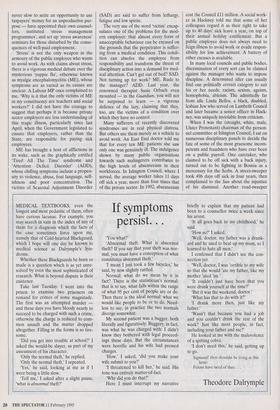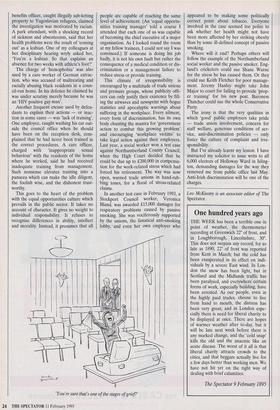MOANING ALL THE WAY TO THE BANK
Leo McKinstry, former head of personnel at
Islington Council, reveals how slackers and malingerers are the new workplace tyrants
I HAD ALWAYS thought that police offi- cers were expected to deal with difficult situations as part of their normal duties. Not so, apparently. Last week it was announced that 14 members of the South Yorkshire Police Force were to receive compensation of up to £250,000 each for the stress and trauma they suffered while on duty during the Hillsborough disaster in 1989.
The Chief Constable of South York- shire, Richard Wells, was reported to be `deeply embarrassed' by the payments, believing that stress is part of life in the police. Some colleagues of the traumatised officers, sharing their chiefs view, said they were 'sickened' by the awards. The Police Federation, however, defended the payments, saying that many officers 'need- ed counselling because of the stress of the disaster'. The Federation is not the only public sector trade union showing new depths of concern about the stress which their members are said to suffer.
The Guardian recently painted a har- rowing picture of the stress suffered by lecturers in further education colleges, institutions not usually associated with traumatic and stressful duties. A survey commissioned by the lecturers' trade union, Natfe, found that 'more than 90 per cent of lecturers feel stress at least some of the time'. One anguished lecturer, Guardian readers were told, 'developed panic attacks going to work and was affect- ed by shakes and diarrhoea. For more than ten months he was on anti-depressants and receiving weekly therapy.' Another lectur- er, perhaps even more disturbingly for her students, 'developed an eye twitch' as a result of her 'relentless 23-hour teaching load' (we were not told whether this was 23 hours per day or per week).
The Guardian report lamented that there is no systematic response by FE colleges to this problem. Other public sector institu- tions have proved more enlightened. A school in Staffordshire recently used money from its hard-pressed budget to pro- vide eight teachers with a day off work at a health farm, to relieve 'classroom stress'. Commenting on use of public funds to pro- vide staff with a relaxing visit to the Jacuzzis and whirlpools of Hoar Cross Hall, a representative of the National Union of Teachers said it was encouraging to see the problem of stress being 'dealt with in an appropriate manner'.
Last year, the BBC hired teams of 'stress counsellors' to help staff cope with the trauma of filming the D-Day commemora- tions in Normandy, a facility unfortunately denied, by the shortsightedness of Eisen- hower, to those who participated in the original landings.
Local authorities and the civil service — never slow to seize an opportunity to use taxpayers' money for an unproductive pur- pose — have appointed their own counsel- lors, instituted 'stress management programmes', and set up 'stress awareness' seminars for those disturbed by the conse- quences of well-paid employment.
`Stress' is not the only weapon in the armoury of the public employee who wants to avoid work. As with claims about stress, there is a vigorous medical debate over the mysterious 'yuppie flu', otherwise known as myalgic encephalomyelitis (ME), whose symptoms are as varied as its causes are unclear. A Labour MP once complained to me, 'Why is it that the only victims of ME in my constituency are teachers and social workers?' I did not have the courage to suggest that perhaps it is because private sector employers are less understanding of this tragic illness, particularly since last April, when the Government legislated to ensure that employers, rather than the State, are responsible for paying sick employees.
ME has brought a host of afflictions in its wake, such as the graphically entitled `Tired All The Time' syndrome and `Attention Deficit Disorder' (ADD), whose chilling symptoms include a propen- sity to violence, abuse, foul language, self- ishness and poor concentration. The victims of Seasonal Adjustment Disorder (SAD) are said to suffer from lethargy, fatigue and low spirits.
The very use of the word 'victim' encap- sulates one of the problems for the mod- ern employer: that almost every form of unacceptable behaviour can be excused on the grounds that the perpetrator is suffer- ing from a medical condition. This condi- tion can absolve the employee from responsibility and transform the threat of disciplinary action into a demand for med- ical attention. Can't get out of bed? SAD. Not turning up for work? ME. Rude to the manager? ADD. Last year, the renowned therapist Susie Orbach even mounted — in the Guardian, you will not be surprised to learn — a vigorous defence of the lazy, claiming that they, too, are the victims of a condition over which they have no control.
Many sufferers of recently discovered syndromes are in real physical distress. But others use them merely as a vehicle to avoid work. An East End doctor told me that for every ten ME patients she saw only one was genuinely ill. The indulgence shown by many public organisations towards such malingerers contributes to the high levels of absenteeism in their workforces. In Islington Council, where I served, the average worker takes 11 days off sick a year, more than four times that of the private sector. In 1992, absenteeism cost the Council £11 million. A social work- er in Hackney told me that some of her colleagues regard it as their right to take up to 40 days' sick leave a year, on top of their annual holiday entitlement. But a public employee does not always need to feign illness to avoid work or evade respon- sibility for low achievement. A battery of other excuses is available.
In many local councils and public bodies, discrimination of every sort can be claimed against the manager who wants to impose discipline. A determined idler can usually find one politically correct category to suit his or her needs: racism, sexism, ageism, homophobia, ableism. The admittedly far from idle Linda Bellos, a black, disabled, lesbian Jew who served on Lambeth Council and later became a senior officer in Hack- ney, was uniquely inviolable from criticism.
When I was the (straight, white, male, Ulster Protestant) chairman of the person- nel committee at Islington Council, I sat on numerous disciplinary panels to decide the fate of some of the most gruesome incom- petents and fraudsters who have ever been on a public payroll. One caretaker, who claimed to be off sick with a back injury, turned out to be fighting in Bosnia as a mercenary for the Serbs. A street-sweeper took 496 days off sick in four years, then complained to the Sun about the injustice of his dismissal. Another road-sweeper always went on his early morning rounds accompanied by two vital pieces of equip- ment: a brush and a can of Carlsberg Spe- cial. We had to fire a gardener whose weak constitution prevented him from turning up for work but never from reaching his local pub. We dealt with a building worker who managed to clock up a half-hour day, and a teacher who remained at home on full pay for more than four years because of procedural wrangles over her position. When she was finally made redundant, she claimed to be the victim of sex discrimina- tion.
Many others charged with heinous crimes would argue that they were the vic- tims of discrimination. One black housing benefits officer, caught illegally sub-letting property to Yugoslavian refugees, claimed the investigation was motivated by racism. A park attendant, with a shocking record of sickness and absenteeism, said that her health problems were the result of 'coming out' as a lesbian. One of my colleagues at her disciplinary hearing wryly asked her, 'You're a lesbian. So that explains an absence for two weeks with athlete's foot?'
The charge of 'homophobia' was also used by a care worker of German extrac- tion, who was accused of maltreating and racially abusing black residents in a coun- cil-run home. In his defence he claimed he was under scrutiny merely because he was an 'HIV positive gay man'.
Another frequent excuse used by defen- dants to explain their actions — or inac- tion in some cases — was 'lack of training'. One employee, caught washing his car out- side the council office when he should have been on the reception desk, com- plained that he had never been trained in the correct procedures. A care officer, charged with 'inappropriate sexual behaviour' with the residents of the home where he worked, said he had received inadequate training from management. Such nonsense elevates training into a panacea which can make the idle diligent, the foolish wise, and the dishonest trust- worthy.
This goes to the heart of the problem with the equal opportunities culture which prevails in the public sector. It takes no account of character. It gives no weight to individual responsibility. It refuses to recognise differences in ability, intellect and morality. Instead, it presumes that all people are capable of reaching the same level of achievement. (An 'equal opportu- nities training manager' told a course I attended that each one of us was capable of becoming the chief executive of a major organisation. As I looked round the room at my fellow trainees, I could not say I was convinced.) If someone is doing his job badly, it is not his own fault but rather the consequence of a medical condition or dis- crimination or a management failure to reduce stress or provide training.
This climate of irresponsibility is encouraged by a multitude of trade unions and pressure groups, whose publicity offi- cers can only justify their existence by fill ing the airwaves and newsprint with bogus statistics and apocalyptic warnings about suffering in the workplace. Every ailment, every form of discrimination, has its own body chanting the mantra for 'government action to combat this growing problem' and encouraging 'workplace victims' to take legal action against their employers. Last year, a social worker won a test case against Northumberland County Council, when the High Court decided that he could be due up to £200,000 in compensa- tion for the work-related stress which had forced his retirement. The way was now open, warned trade unions in hand-rub- bing tones, for a flood of stress-related claims.
In another test case in February 1993, a Stockport Council worker, Veronica Bland, was awarded £15,000 damages for respiratory problems caused by passive smoking. She was vociferously supported by the unions, the fanatical anti-smoking lobby,' and even her own employer who `You're sure that's one of the stages of grief?' appeared to be making some politically correct point about tobacco. Everyone involved in the case seemed too polite to ask whether her health might not have been more affected by her striking obesity than by some ill-defined concept of passive smoking.
Where will it end? Perhaps others will follow the example of the Northumberland social worker and the passive smoker. Eng- land's cricketers could sue Shane Warne for the stress he has caused them. Or they could sue Keith Fletcher for poor manage- ment, Jeremy Hanley might take John Major to court for failing to provide 'prop- er training' for his new post. Baroness Thatcher could sue the whole Conservative Party, The irony is that the very qualities in which 'good' public employers take pride — trade union involvement, concern for staff welfare, generous conditions of ser- vice, anti-discrimination policies — only foster the culture of complaint and irre- sponsibility.
But I've already learnt my lesson. I have instructed my solicitor to issue writs to all 6,000 electors of Holloway Ward in Isling- ton, demanding damages for the way they removed me from public office last May. Anti-Irish discrimination will be one of the charges.
Leo McKinstry is an associate editor of The Spectator.





























































 Previous page
Previous page